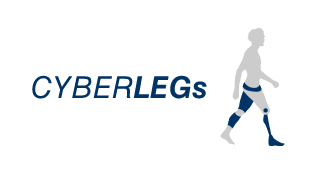
The CYBERnetic LowEr-Limb CoGnitive Ortho-prosthesis Plus Plus
OBJECTIVES
The global goal of the CYBERLEGs Plus Plus project is to validate the technical and economic viability of the powered robotic ortho-prosthesis developed within the framework of the FP7-ICT-CYBERLEGs project as a means to enhance/restore the mobility of transfemoral amputees and to enable them to perform locomotion tasks such as ground-level walking, walking up and down slopes, climbing/descending stairs, standing up, sitting down and turning in scenarios of real life. Restored mobility will allow amputees to perform physical activity thus counteracting physical decline and improving the overall health status and quality of life.
EXPECTED IMPACT
By demonstrating in an operational environment (TRL=7) –from both the technical and economic viability view point– a modular robotics technology for healthcare, with the ultimate goal of fostering its market exploitation CYBERLEGs Plus Pus will have an impact on:
- Society: CLs++ technology will contribute to increase the mobility of dysvascular amputees, and, more generally, of disabled persons with mild lower-limb impairments;
- Science and technology: CLs++ will further advance the hardware and software modules of the ortho-prosthesis developed within the FP7 CYBERLEGs project and validate its efficacy through a multi-centre clinical study;
Market: CLs++ will foster the market exploitation of high-tech robotic systems and thus will promote the growth of both a robotics SME and a large healthcare company.
PARTNERS
SCUOLA SUPERIORE SANT'ANNA (SSSA)
UNIVERSITÉ CATHOLIQUE DE LOUVAIN (UCL)
VRIJE UNIVERSITEIT BRUSSEL (VUB)
UNIVERZA V LJUBLJANI (UL)
FONDAZIONE DON CARLO GNOCCHI (FDG)
ÖSSUR (OSS)
IUVO S.R.L. (IUVO)
Coordinator:
Prof. Nicola Vitiello, The BioRobotics Institute
Scuola Superiore Sant’Anna, Pisa, Italy
nicola.vitiello@santannapisa.it
Project website: www.cyberlegs.org

Call H2020-ICT-26-2016 a
Duration 1 January 2017 – 31 December 2020
Project ID 731931